
The American Geophysical Union (AGU) is a 501(c)(3) nonprofit organization of Earth, atmospheric, ocean, hydrologic, space, and planetary scientists and enthusiasts that according to their website includes 130,000 people. AGU's activities are focused on the organization and dissemination of scientific information in the interdisciplinary and international fields within the Earth and space sciences. The geophysical sciences involve four fundamental areas: atmospheric and ocean sciences; solid-Earth sciences; hydrologic sciences; and space sciences. The organization's headquarters is located on Florida Avenue in Washington, D.C.

The European Geosciences Union (EGU) is a non-profit international union in the fields of Earth, planetary, and space sciences whose vision is to "realise a sustainable and just future for humanity and for the planet." The organisation has headquarters in Munich (Germany). Membership is open to individuals who are professionally engaged in or associated with these fields and related studies, including students and retired seniors.

Don Lynn Anderson was an American geophysicist who made significant contributions to the understanding of the origin, evolution, structure, and composition of Earth and other planets. An expert in numerous scientific disciplines, Anderson's work combined seismology, solid state physics, geochemistry and petrology to explain how the Earth works. Anderson was best known for his contributions to the understanding of the Earth's deep interior, and more recently, for the plate theory hypothesis that hotspots are the product of plate tectonics rather than narrow plumes emanating from the deep Earth. Anderson was Professor (Emeritus) of Geophysics in the Division of Geological and Planetary Sciences at the California Institute of Technology (Caltech). He received numerous awards from geophysical, geological and astronomical societies. In 1998 he was awarded the Crafoord Prize by the Royal Swedish Academy of Sciences along with Adam Dziewonski. Later that year, Anderson received the National Medal of Science. He held honorary doctorates from Rensselaer Polytechnic Institute and the University of Paris (Sorbonne), and served on numerous university advisory committees, including those at Harvard, Princeton, Yale, University of Chicago, Stanford, University of Paris, Purdue University, and Rice University. Anderson's wide-ranging research resulted in hundreds of published papers in the fields of planetary science, seismology, mineral physics, petrology, geochemistry, tectonics and the philosophy of science.
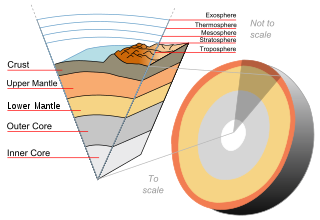
The following outline is provided as an overview of and topical guide to Earth science:
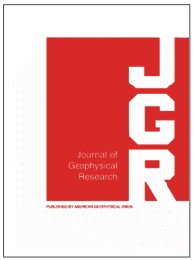
The Journal of Geophysical Research is a peer-reviewed scientific journal. It is the flagship journal of the American Geophysical Union. It contains original research on the physical, chemical, and biological processes that contribute to the understanding of the Earth, Sun, and Solar System. It has seven sections: A, B, C (Oceans), D (Atmospheres), E (Planets), F, and G (Biogeosciences). All current and back issues are available online for subscribers.
W. Gary Ernst is an American geologist specializing in petrology and geochemistry. He currently is the Benjamin M. Page Professor Emeritus in Stanford University's Department of Geological Sciences.
Earth science is an all-embracing term for the sciences related to the planet Earth. It is arguably a special case in planetary science, the Earth being the only known life-bearing planet. There are both reductionist and holistic approaches to Earth science. There are four major disciplines in earth sciences, namely geography, geology, geophysics and geodesy. These major disciplines use physics, chemistry, biology, chronology and mathematics to build a quantitative understanding of the principal areas or spheres of the Earth system.
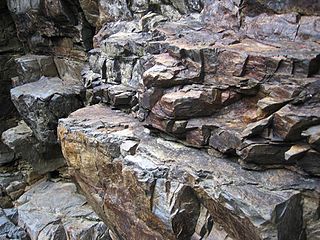
Earth science or geoscience includes all fields of natural science related to the planet Earth. This is a branch of science dealing with the physical, chemical, and biological complex constitutions and synergistic linkages of Earth's four spheres, namely biosphere, hydrosphere, atmosphere, and geosphere. Earth science can be considered to be a branch of planetary science, but with a much older history. Earth science encompasses four main branches of study, the lithosphere, the hydrosphere, the atmosphere, and the biosphere, each of which is further broken down into more specialized fields.

A geologist is a scientist who studies the solid, liquid, and gaseous matter that constitutes Earth and other terrestrial planets, as well as the processes that shape them. Geologists usually study geology, earth science, or geophysics, although backgrounds in physics, chemistry, biology, and other sciences are also useful. Field research is an important component of geology, although many subdisciplines incorporate laboratory and digitalized work. Geologists can be classified in a larger group of scientists, called geoscientists.
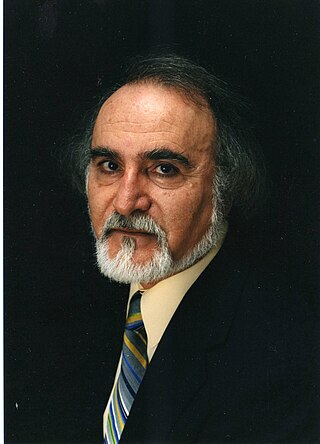
Manuel Berberian is an Iranian-Armenian earth scientist. He was born on the 27th of October, 1945 into an immigrant Armenian family in Tehran. He specializes in earthquake seismology, active faulting and folding, active tectonics, continental tectonics, historical seismicity, archaeoseismicity, earthquake hazard minimization, geological mapping, and environmental science and engineering.
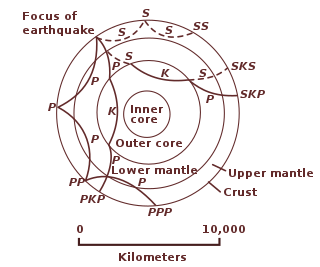
The following outline is provided as an overview of and topical guide to geophysics:
Bernard (Bernie) Wood is a British geologist, and professor of mineralogy and senior research fellow at the University of Oxford. He specializes in the thermodynamics of geological systems, using experimental techniques. He is a prominent figure in the field of experimental petrology, having received multiple awards throughout his career and taught at several universities worldwide.
Donald Bruce Dingwell is a Canadian geoscientist who is the director of the Department of Earth and Environmental Sciences and Ordinarius for Mineralogy and Petrology of the Ludwig Maximilian University of Munich. He is also currently vice-president of the Academia Europaea. From September 2011 to December 2013 he was the third and last secretary general of the European Research Council (ERC) where he embarked on a global participation campaign for the ERC. He is also a past-President of the European Geosciences Union and the current past-president of the International Association of Volcanology and Chemistry of the Earth's Interior (IAVCEI), founded in 1919.
Stanley Robert Hart is an American geologist, geochemist, leading international expert on mantle isotope geochemistry, and pioneer of chemical geodynamics.
Penelope King uses geochemistry and cosmochemistry to study planetary processes to better understand past and future planetary environments, and what this information may tells us about climate change. She is a professor at the Australian National University (ANU) in the Research School of Earth Sciences (RSES). King holds many awards, including Fellow of the American Geophysical Union and the Mineralogical Society of America in 2019, and winning the AGU Joanne Simpson Medal for Mid-Career Scientists the same year. She currently leads a research group examining surface and interior processes on planetary bodies.

The Department of Earth and Environmental Sciences at The University of Manchester is one of the oldest earth and environmental science departments in the UK. The Department takes roughly 100 new undergraduates and 140 postgraduates each year, and employs 90 members of academic staff, 41 postdoctoral researchers, 27 technical staff and 20 administrative staff.
Catherine Chauvel is a geochemist at the Institut de Physique du Globe de Paris known for her research on the impact of volcanic activity on the chemistry of the mantle, continental crust, and island arc geochemistry.









